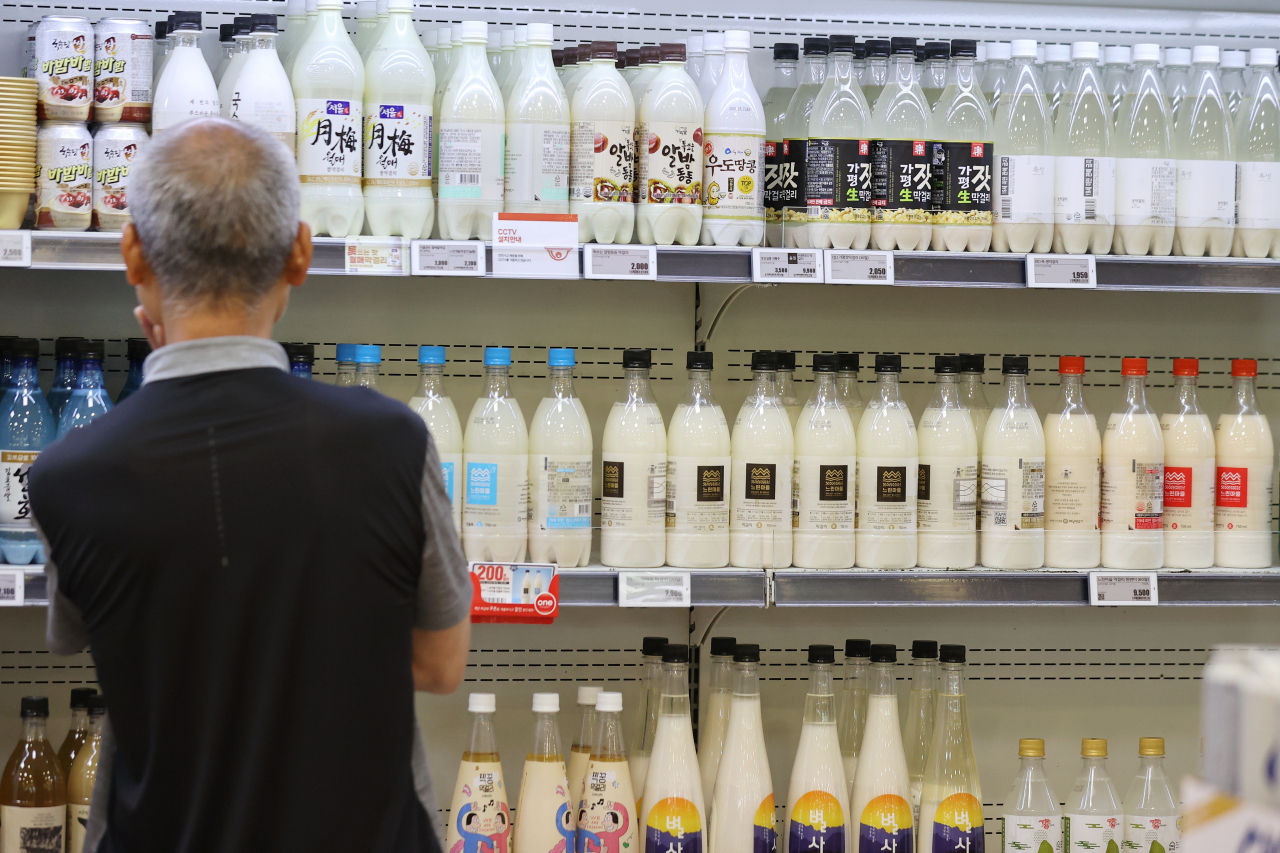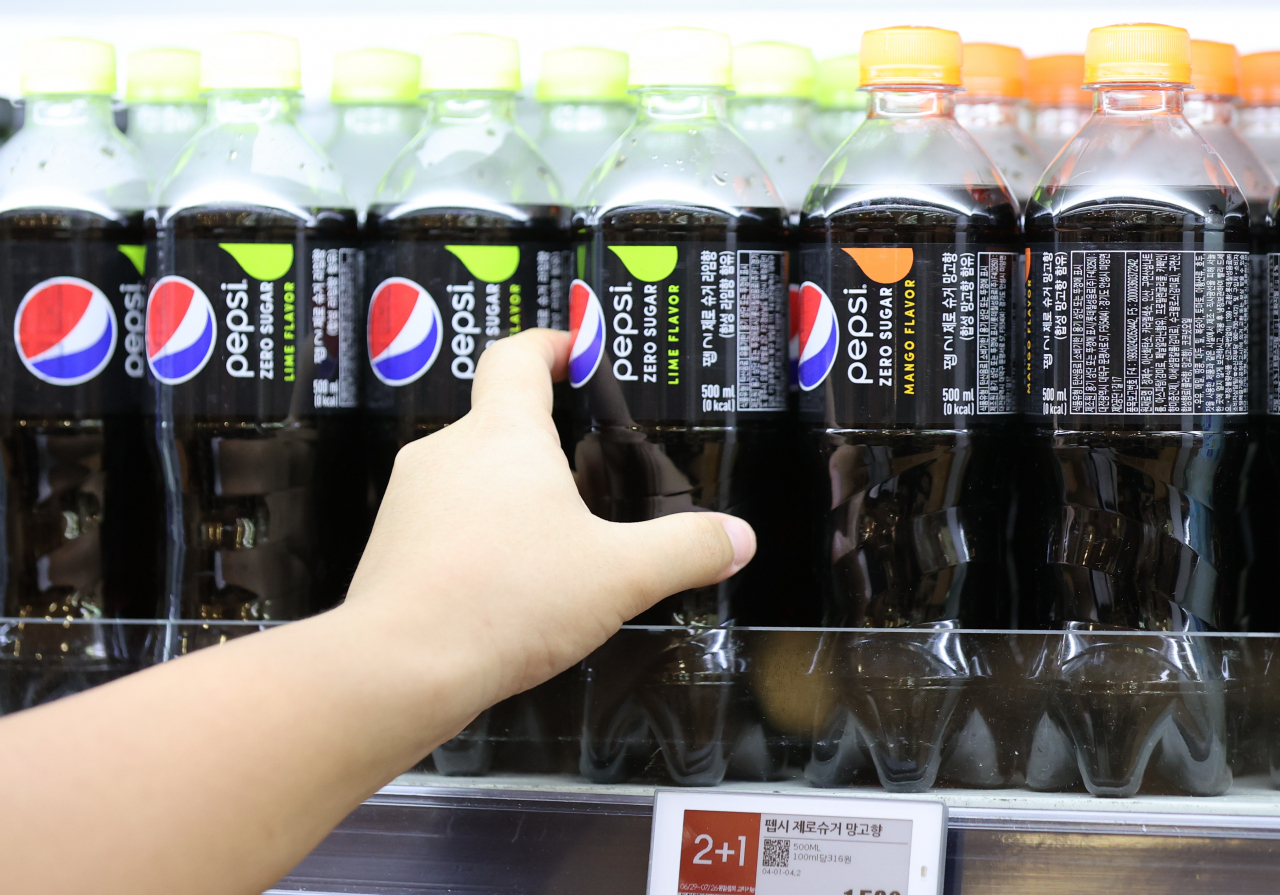 |
Makgeolli at a supermarket in Seoul on July 4. (Yonhap) |
For Kim Hyo-jung, a 31-year-old office worker in Seoul, who is one of many health-conscious consumers looking to avoid sugar and added calories at every turn, sugar-free drinks have long been a fact of life.
“Who doesn’t know too much sugar is bad for you? I don't think I am being particularly picky because almost everyone around me (thinks) like me,” Kim said, adding that finding sugar-free soft drinks hasn’t been too hard.
For some time, sugar-free or zero-sugar products have been the norm in the local food and beverage industry because they use artificial sweeteners that have almost no caloric value. Such products range from beverages and alcohol to baked and canned goods, plus even cough drops.
The no-calorie factor seems to appeal to people across all age groups, including teenagers and moms conscious of what they feed their children. That’s because sugar-free products are considered a boost to weight control and avoiding the potential negative health effects of sugar, though the World Health Organization called them misconceptions in a report in May.
According to Euromonitor International, a London-based market research firm, the local sugar-free market size last year is believed to have expanded almost three times since 2016, when it was worth around 90.3 billion won ($70 million).
The demand for high-sugar drinks like juice, however, has been on the decline. According to South Korea’s Food Information Statistics System, the local juice market shrank to 643.2 billion won in 2021 from 743 billion won in 2017.
“You don’t have to look hard to find zero-sugar drinks, so naturally a decline (in demand for high-sugar drinks) is inevitable,” said an industry insider who wished to remain anonymous.
The latest sales data released by Lotte Chilsung Beverage, the industry leader, showed its sugar-free drink sales last year came to 190 billion won, a 111 percent on-year rise.
The increasing appetite for sugar-free products was most noticeable in Coca-Cola beverages. The sales of Coke Zero rose 29 percent on-year in 2022, compared with regular Coke’s 6 percent rise in the same period, according to LG Household & Health Care, the exclusive local distributor of Coca-Cola.
Roadblock ahead
But the trend may soon be hitting a potential slowdown, with news that a popular artificial sweetener, aspartame, is set to be declared as “possibly carcinogenic to humans” by the International Agency for Research on Cancer (IARC), the World Health Organization’s cancer research arm.
The additive is likely to be in Group 2B, the third-highest risk group after Group 1 and 2A, which the agency describes as “carcinogenic” and “probably carcinogenic,” respectively.
At the same time, a separate WHO expert committee on food additives -- the Joint WHO and Food and Agriculture Organization’s Expert Committee on Food Additives or JECFA -- will also reveal acceptable daily intake (ADI) recommendations of the additive. That’s what the WHO defines as the amount that can be digested over a lifetime without significant risks to health.
Aspartame is about 200 times sweeter than sugar and is one of the 22 sweeteners approved by the Ministry of Food and Drug Safety. The news that the low-calorie sugar substitute, also approved by the US Food and Drug Administration in 1974, could be declared a possible carcinogen immediately unsettled the local beverage and makgeolli markets.
Lotte Chilsung Beverage, which distributes Pepsi Zero, a product made with aspartame, said it was consulting its global headquarters about using alternatives, without elaborating further.
An official from Seoul Jangsoo, which accounts for around 40 percent of the local makgeolli market, said makgeolli makers would take joint action upon the declaration, adding that they “will also consider changing recipes to single out the additive if needed.”
Meanwhile, some retailers have already launched campaigns touting non-aspartame products to draw in customers increasingly shying away from the potential health risks.
 |
Zero-sugar Pepsi at a supermarket in Seoul on July 4. (Yonhap) |
“The word ‘carcinogen’ bothers me,” said Park Hyun-sun, a mother of two preschool children who lives in Seoul. “It’s not as though we can’t avoid aspartame products, so I think I will skip those until the authorities say they are okay to consumers, or they come up with a way that makes consuming them safe.”
Authorities and experts alike say people don’t need to worry too much. The Food Ministry says Koreans on average consumed only 0.12 percent of the ADI set by the ministry in 2019, citing its latest data on the additive.
“Our assessment is that the average intake of aspartame by Koreans is low,” ministry spokesperson Kang Baeg-won said, adding that the regulator will look into what JECFA has to say about the new recommended ADI for aspartame Friday.
Authorities would need to see what kind of “scientific evidence” JECFA is using to back its latest findings about the sweetener, according to Kang.
Ha Sang-do, a professor of food safety at Chung-Ang University, said possible carcinogens are found in almost every food and that it is important for people to regulate their diets in a way that leads them to consume not too many additives in one sitting.
“As long as we do that, I don’t think we need to be so alarmed or scared even,” Ha said, referring to alcoholic drinks, Group 1 substances the IARC says are carcinogenic. “The fact the something is carcinogenic doesn’t mean people consuming it are going to get cancer right way.”
Lee Duck-hwan, a professor emeritus of chemistry at Sogang University, argued that the declaration isn’t meant for the general public.
“This declaration from the agency is for private and public sector experts like governments,” Lee said of the Friday ruling. “It’s essentially asking those people to come up with their own assessment after research and roll out measures making consuming the additive safe enough for the general public. So no, I don’t think average Koreans need to worry at all.”







![[Today’s K-pop] Blackpink’s Jennie, Lisa invited to Coachella as solo acts](http://res.heraldm.com/phpwas/restmb_idxmake.php?idx=644&simg=/content/image/2024/11/21/20241121050099_0.jpg)